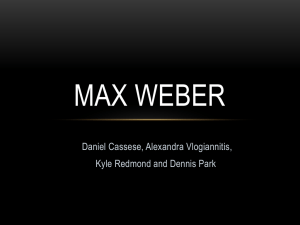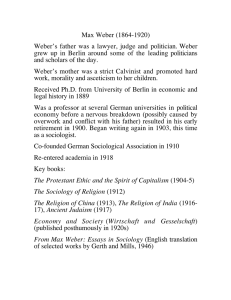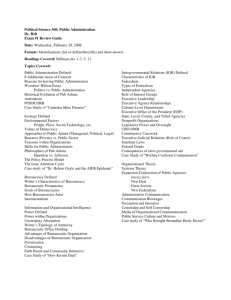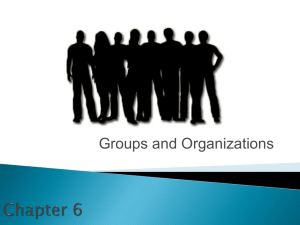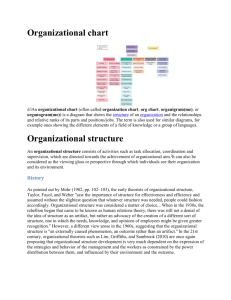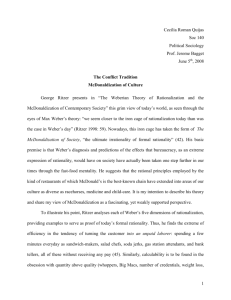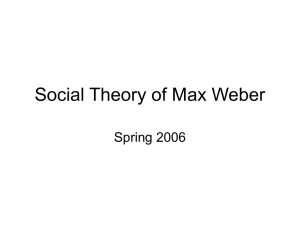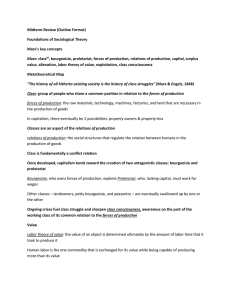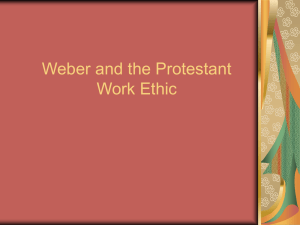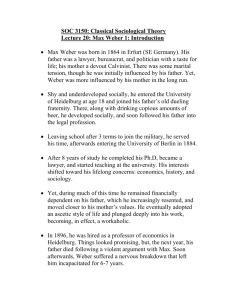Max Weber
advertisement
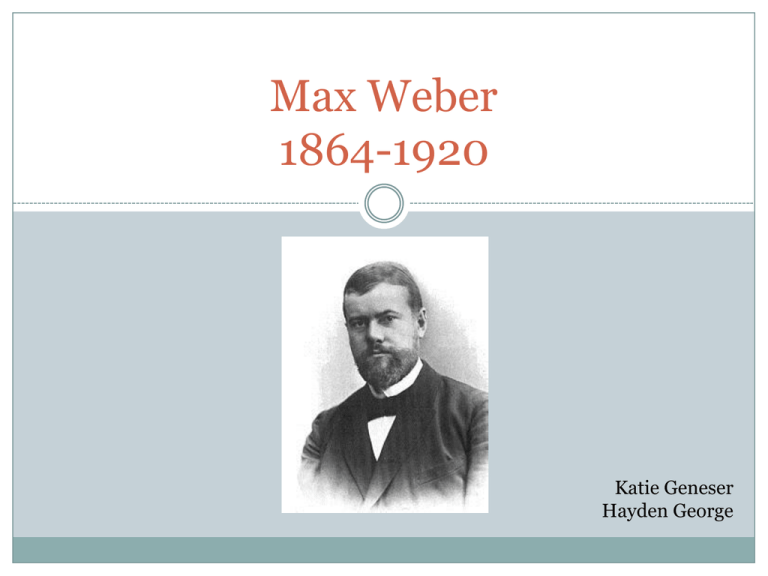
Max Weber 1864-1920 Katie Geneser Hayden George Background Born 1864, Thuringia Father was wealthy civil servant who was highly involved in both politics and academics For Christmas one year he wrote two analytical essays to give to his parents as gifts Attended law school Spent some time in the military Background In 1893 he married Marianne Schnitger a feminist activist and author Took a job as a professor eventually ending up at the University of Heidelberg Early Work Early on took an interest in contemporary social policy Felt that the role of economics was the primary source of solving social problems Influences Strongly influenced by German Idealism Linked romanticism and Enlightenment politics Kant, Freud, and Simmel Strongly influenced by Marx’s ideas of socialism and active politics Differed on the idea of utopian society Concepts and Contributions Bureaucracy Pre-conditions Growth in space and population Growth in complexity of the administrative tasks being carried out Existence of monetary economy, requires a more efficient administrative system Concepts and Contributions Bureaucracy Communication and transportation policies make more efficient administration possible Hierarchical organization Delineated lines of authority in a fixed area of activity Rules are implemented by neutral officials, not the power elite Advancements depend on technical qualifications from organizations not individuals Can be a threat to individual freedom Concepts and Contributions Rationalization “The fate of our times is characterized by rationalization and, above all, by the ‘disenchantment of the world’” Instead of the power elite holding society back, it is the laws, rules and regulations capitalism requires Curtails people’s freedoms and traps them in bureaucratic society Process is less welcome of individualism and “dehumanizes people” Concepts and Contributions Rationalization Zweckrational (i.e., formal) rationality. The rationality of means-ends relationships, wherein an identifiable goal is sought by pursuing reasonably defined means. Wertrational (i.e., substantive) rationality. The rationality of non-goal oriented behavior, wherein behavior is pursued independently of the prospects of success. Concepts and Contributions Verstehen German word for interpretive understanding Looking at society from your own point of view rather than from that of the indigenous culture How people give meaning to the social world around them Gives a subjective understanding about individual and group behavior Concepts and Contributions The Protestant Ethic The Protestant Ethic and the Spirit of Capitalism (1905) Emphasizes hard work, frugality, and prosperity as a display as a person’s salvation in the Christian faith Societies that are more Protestant tend to be more bureaucratic than capitalist and to Weber this is a good thing Workers are more likely to be devoted to their craft and are less alienated Views on Society Bureaucratic Society Rather than capitalism or communism, Weber thought society should be run through a system of well organized institutions Society can be understood through empirical observation rather than quantitative research Power is not just in the hands of the elite Relevancy Influenced Parsons, Habermas, and many others Presented sociology as the “science of human social action” Developed antipositivism; stressing the differences between social and natural sciences Weber Bureaucracies: showed how there are bureaucratic elements of every part of society Limitations His specific explanations for society in his time are hard to generalize for other circumstances in society Failed to see all the positive aspects of rationalization and deemed society to be doomed and trapped in an “iron cage” of its own making Bureaucratic features of Weber’s ideal society might actually be inefficient (argued by Merton)
